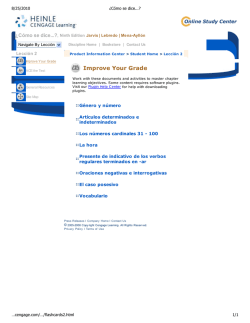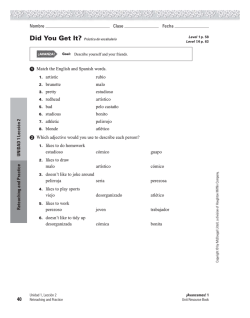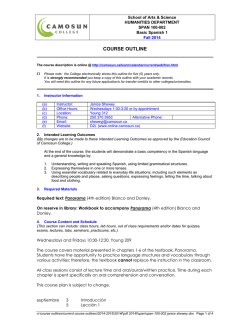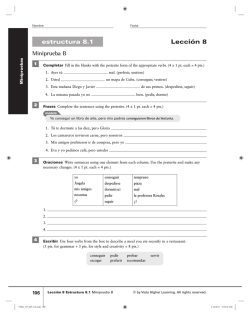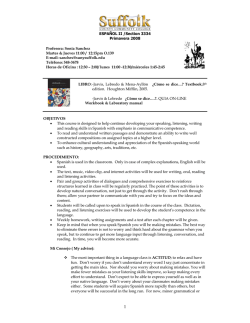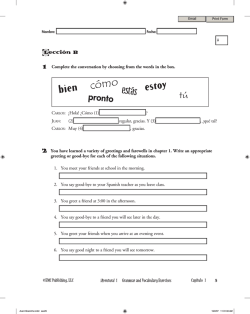
Current View - Houston Community College
World Languages Program Central College-Distance Education SUMMER 2015 SPAN 2311 – Intermediate Spanish I F8A- 8 weeks CRN 59641 3 semester-hour credits (3 lecture)/48 hours per semester CONTACT INFORMATION Professor: Dr. Margaret Eomurian Email: Please use Quickmail inside the course to contact me. This is really the best way to reach me. I will check it frequently between Monday and Friday (not on weekends) and respond as soon as I am able. Before the course begins and after the course ends, if you need to contact me you can use my college email address: [email protected]. Please understand that if you use it during the semester, it may take me longer to respond because I give priority to the emails received in the Eagle Online course. Phone: If you need to speak with me via phone, please email me a phone number or leave me a message at 713-718-6675. Be sure to leave your name, your phone number, and the CRN of the course that you are taking. Campus office: If you need to meet with me in person, my office is located in SJAC 119 at Central College. Call or email to make an appointment. COURSE DESCRIPTION This is a first semester Intermediate Spanish course that satisfies and transfers as the first semester sophomore-level Spanish requirement at all major universities. The course is a consolidation of skills acquired at the introductory level with further development of proficiency in listening, speaking, reading, and writing. The emphasis is on comprehension, appreciation, and interpretation of the cultures of the Spanish-speaking world. PREREQUISITES To take this course you must have already completed at least one mandatory prerequisite: • 2 semesters or more of college Spanish (SPAN 1411, 1412 or equivalent) or • 3 years or more of high school Spanish OR Score a minimum of 50 on the CLEP You must also be placed into INRW 0420 or higher. LEARNING OUTCOMES PROGRAM LEARNING OUTCOMES 1. Speak clearly and fluently enough for a target-language speaker to understand and interpret intent without difficulty. 2. Comprehend the main points of standard discourse and authentic material in target language spoken at near-native speed. 3. Write simple descriptions and narrations of paragraph length on everyday events and situations in different time frames. 4. Read with understanding authentic written material in the target language on a variety of topics related to daily life in the target-language world. 5. Demonstrate knowledge of and sensitivity to characteristic perspectives, practices and products that reflect the culture of the target language. STUDENT LEARNING OUTCOMES 1. Formulate and express opinions in the target language on familiar matters as well as on topics related to the culture, history, current events and daily life of the target-language community. 2. Comprehend the main points of (a) standard discourse on familiar topics and (b) clearly-delivered authentic cultural material (TV programs, videos, movies). 3. Compose well-structured short essays and reports that express personal points of view. 4. Draw logical conclusions from noncomplex, authentic factual and literary texts which put forward arguments and different points of view. 5. Describe and analyze, with sensitivity and appreciation, the relationship between language, culture and world view as well as the similarities and differences between specific cultural practices and perspectives. LEARNING OBJECTIVES 1.1 Speak in complete sentences about everyday activities using subjunctives, perfect forms, future, and conditional tenses. 1.2 Construct dialogues in the present, past, and future tenses of the indicative and subjunctive mood regarding nature, the environment, personal relationships, professions, government, and traveling abroad. 2.1 Respond accurately in the past, present or future and expressing emotions, doubt, influence, what you had done, conjecture, future actions, and hypothetical situations in professional and environmental issues, and the future in general. 2.2 Elaborate in the present, past or future of the indicative and subjunctive mood on elements of a given conversation 3.1 Write cohesive sentences and paragraphs in the present, past and future describing situations regarding nature, the environment, personal relationships, professions, government, and traveling abroad. 3.2 Narrate a short paragraph using the present, past and future tenses in the indicative and subjunctive mood. 4.1 Read an article and respond accurately to questions in different modalities 4.2 Analyze and summarize major themes and characters from selected readings 5.1 Recognize and interpret the nuances within the target culture 5.2 Evaluate the cultural aspects that provide insight into the unique characteristics between the target cultures and the United States’ culture. COURSE INFORMATION Course Materials ¡Adelante Tres! : An Invitation to Spanish, 2nd edition with Supersite +WebSAM. ISBN# 978-161857-988-1 Note: This is a shrink-wrapped package put together specifically for the online SPAN 2311 courses. You must buy a new textbook and online access code for this online course. There are only two sources to make sure you get the correct textbook and don’t end up spending a lot of extra money by getting a used book somewhere and buying the access code separately from the publisher: 1) The HCC bookstore at: http://hccs.bncollege.com or 2) The publisher’s website: http://vistahigherlearning.com/students/store/spanish-programs/adelantetres-2nd-edition.html Please make arrangements to have your book by the first day of scheduled classes (June 8). You will be ahead of the game to buy your book before classes start so you can begin work in the class. Not having the book will put you behind in the class work immediately, and the work cannot be made up. Remember: Summer sessions are short and the pace is much faster. OTHER MATERIALS RECOMMENDED A microphone to record your voice if your computer doesn’t already have a built-in microphone. DISTANCE EDUCATION Become familiar with the Distance Education Student Handbook, which you should have reviewed as part of the mandatory orientation. This handbook contains policies and procedures unique to the distance education student. You will find valuable information, answers and resources, such as important DE contacts, policies and procedures on how to drop, attendance requirements, student service issues (ADA, financial aid, degree planning, etc.), course information, testing procedures, technical support, and academic calendars. You can find the handbook by going to this link: http://de.hccs.edu/media/houston-community-college/distance-education/student-services/20142015HCC-DE-Student-Handbook-.pdf Tech Support There are two sources you can contact if you need tech support: • For Adelante tech support, you will find have three options at the bottom of the Adelante website: 1) go to support.vhlcentral.com; 2) submit Help request; or 3) call (800) 248-2813 • For Eagle Online tech support, go to the HCCEagle Online support website and you will find tutorials (including movies), phone and chat support, or call 713-718-2000, options 4, 2, 3 (available 24 x 7) GRADE BREAKDOWN Supersite Assignments (40%): For each lesson, you will have assignments to do online through the Supersite. These will be graded activities. You will have unlimited attempts for many of these, and they will be graded automatically by the computer once you hit “submit.” I will grade the writing and recording assignments. Midterm Exam (30%): There will be a proctored midterm exam over Lecciones 1 – 3 given on the following dates and places: Friday, June 26 Central Campus San Jacinto Building – 1300 Holman, 77004 -1st floor, Exam times: 4:00-9:00 PM (LAST ADMIT 7:00 PM) Saturday, June 27 Alief Campus – 2811 Hayes Rd. 77082 Exam times: 10:00 AM-3:00 PM (LAST ADMIT 1:00 PM) Sunday, June 28 Eastside Campus – 6815 Rustic St. 77087 – Workforce Building Exam times: 10:00 AM-3:00 PM (LAST ADMIT 1:00 PM) ******Signs will be posted to guide students to the testing area****** Final Exam (30%): This will be a comprehensive proctored exam over all 6 lessons at the following locations: Friday, July 31 Central Campus San Jacinto Building – 1300 Holman, 77004 -1st floor, Exam times: 4:00-9:00 PM (LAST ADMIT 7:00 PM) Saturday, August 1 Alief Campus – 2811 Hayes Rd. 77082 Exam times: 10:00 AM-3:00 PM (LAST ADMIT 1:00 PM) Sunday, August 2 Eastside Campus – 6815 Rustic St. 77087 – Workforce Building Exam times: 10:00 AM-3:00 PM (LAST ADMIT 1:00 PM) IMPORTANT: For students who live outside the service area of HCC and cannot come to Houston to take the midterm and final exams, you will need to find a proctor at a university or college testing center near where you live. You will need to complete a proctor approval form 2 weeks before the exam. Information is posted on the Eagle Online site for this course. In accordance with HCC policy, final grades in this course will be whole letter grades based on the following scale: 90-100 = A, 80-89 = B, 70-79 = C, 60-69 = D, 59 or below = F. IMPORTANT DATES June 8: Classes Begin *June 15: Official day of record. July 4 : Offices Closed—Independence Day Holiday July 13: Last Day for Administrative/Student Withdrawals 4:30pm August 2: Instruction Ends July 31-Aug. 2: Final Examination * DE students who do not actively participate before this date WILL BE DROPPED for nonattendance. Active participation is BOTH of the following: You will need to respond in two discussion forums on Eagle Online: 1) “Meet and Greet” , where you will introduce yourself – in Spanish—to your classmates with your name, major and the reason you are taking the course. You will also respond to two other students’ posts. 2) “The syllabus”, where you will make a comment on something that you found interesting about the syllabus. You may not repeat what someone else has posted. COURSE POLICIES ATTENDANCE POLICY Although this course is online, you still must “attend” regularly. You ought to sign on at least three times a week to complete course work. Regular attendance will be gauged by the prompt completion of work as assigned by due dates. Not completing assignments will be considered absence, and you may be withdrawn from the course if you do not sign in and make adequate progress in completing assignments. Your success in this course depends upon your steady completion of work as it is due. DUE DATES AND MAKE UPS For each of your online assignments, you will see a due date. In order to keep up with the course, it is important that you follow these dates. Once due dates pass, you will not be permitted to submit missed work. No make-ups on course work, like forum posts! No make-ups on midterm or final exams! Please contact me if you miss the midterm or the final exam. ACADEMIC HONESTY Plagiarism (consult your student handbook on scholastic dishonesty) results in a grade of zero on that assignment. Cheating or collusion (consult your student handbook on scholastic dishonesty) results in a grade of zero on that assignment. The second offense will result in a failing grade for the course. This policy will be strictly enforced. Note: Using online translation tools to translate any sentence or having someone else complete your assignments is considered cheating. EGLS3---EVALUATION FOR GREATER LEARNING STUDENT SURVEY SYSTEM At Houston Community College, professors believe that thoughtful student feedback is necessary to improve teaching and learning. During a designated time, you will be asked to answer a short online survey of research-based questions related to instruction. The anonymous results of the survey will be made available to your professors and division chairs for continual improvement of instruction. For instructions on how to fill out the on-line evaluation of instruction, go to: http://www.hccs.edu/EGLS3 SPAN 2311 en linea COURSE CALENDAR / PLAN DE ESTUDIOS 8 de junio: Go to Eagle Online and respond in two discussion forums: 3) “Meet and Greet” , where you will introduce yourself – in Spanish—to your classmates with your name, major and the reason you are taking the course. You will also respond to two other students’ posts. 4) “The syllabus”, where you will make a comment on something that you found interesting about the syllabus. You may not repeat what someone else has posted. Note: Due dates below for assignments are suggested dates for keeping pace with the course. Semana uno: 8 al 12 de junio Objetivos Libro • • • • • Review words related to daily routines, food, parties and celebrations, health, technology, cars, and homes and household chores. Review reflexives, reciprocal reflexives, constructions with se, and commands. Read about girls' fifteenth birthdays in the Spanish-speaking world. Review the preterite, the imperfect, and the preterite vs. the imperfect. Review the formation of the present subjunctive. • • • • • • • Lección de repaso: Opener, p. 1 Contextos, pp. 2–3 Estructura 1, pp. 4-7: Reflexives Reciprocal reflexives Constructions with se Commands Actividades en el Supersite • Supersite: Lección de repaso Contextos; Estructura 1 Cultura, pp. 8–9 Estructura, 2, pp. 10-13: The preterite The imperfect Preterite and imperfect • Supersite: Lección de repaso Cultura; Estructura 2 Review the formation of the present subjunctive Estructura 3, pp. 14-17: Introduction to the subjunctive • Supersite: Lección de repaso Estructura 3 Suggested due date 14 de junio • Semana dos: 15 al 21de junio Lección 1: Opener, p. • 19 Contextos, pp. 20–23 • • Watch a video segment about Marissa and Jimena's visit to a turtle sanctuary and Juan Carlos and Felipe's jungle tour. Learn about punctuation marks. Use the subjunctive with verbs of emotion. • Workbook: Lección 1 Contextos, pp. 53–54 Lab Manual: Lección 1 Contextos, p. 69 Supersite: Lección 1 Contextos Video Manual: Lección 1 Fotonovela, pp. 63–64 Lab Manual: Lección 1 Pronunciación, p. 70 Supersite: Lección 1 Fotonovela Fotonovela: Aventuras en la naturaleza, pp. 24–27 • • Estructura 1.1, The subjunctive with verbs of emotion, pp. 30–33 • • Express doubt, disbelief, and denial. Use the subjunctive with conjunctions. • • • • Read two fables. Write a letter or an article. • • Estructura 1.2, The subjunctive with doubt, disbelief, and denial pp. 34–37 Estructura 1.3, The subjunctive with conjunctions, pp. 38– 41 Lectura, pp. 44–45 Escritura, p. 46 • Supersite: Lección 1 Lectura, Escritura • • Listen to a speech. Watch a TV commercial. • • Escuchar, p. 47 En pantalla, p. 48 • Supersite: Lección 1, Escuchar, En pantalla • Recapitulación, pp. 42–43 Review Lección 1 Mini prueba A • Supersite: Lección 1 Recapitulación • • • • • • • • Supersite: Lección 1, Estructura 1.1 Workbook: Lección 1 Estructura 1.1, pp. 55–56 Lab Manual: Lección 1 Estructura 1.1, p. 71 Workbook: Lección 1 Estructura 1.2, pp. 57–58; Estructura 1.3, pp. 59–60 Lab Manual: Lección 1 Estructura 1.2, p. 72; Estructura 1.3, p. 73 Supersite: Lección 1 Estructura 1.2, 1.3 Suggested due date 21 de junio • Semana tres: 22 al 28 de junio • • • • • • • Learn and practice words related to city life. • • Watch a video • segment about Maru's adventures in Mexico City. Learn about abbreviations. Read about subway • systems in Spanish- • speaking countries. Use the subjunctive in adjective clauses. Use nosotros/as commands. Use past participles as adjectives. • • Lección 2: Opener, p. 75 Contextos, pp. 76–79 Fotonovela: Corriendo por la ciudad, pp. 80–83 • • • • • • Cultura, pp. 84–85 Estructura 2.1, The subjunctive in adjective clauses, pp. 86–89 • Estructura 2.2, Nosotros/as commands, pp. 90–92 Estructura 2.3, Past participles used as adjectives, pp. 93–95 • • • • • • • Read a short story. Write an e-mail. • • Lectura, pp. 98–99 Escritura, p. 100 • • Listen to a conversation between two friends. Watch a TV ad. • • Escuchar, p. 101 En pantalla, p. 102 • • Workbook: Lección 2 Contextos, pp. 107–108 Lab Manual: Lección 2 Contextos, p. 123 Supersite: Lección 2 Contextos Video Manual: Lección 2 Fotonovela, pp. 117–118 Lab Manual: Lección 2 Pronunciación, p. 124 Supersite: Lección 2 Fotonovela Workbook: Lección 2 Estructura 2.1, pp. 109–110 Lab Manual: Lección 2 Estructura 2.1, p. 125 Supersite: Lección 2 Cultura, Estructura 2.1 Workbook: Lección 2 Estructura 2.2, pp. 111–112; Estructura 2.3, pp. 113–114 Lab Manual: Lección 2 Estructura 2.2, p. 126; Estructura 2.3, p. 127 Supersite: Lección 2 Estructura 2.2, 2.3 Supersite: Lección 2 Lectura, Escritura Supersite: Lección 2 Escuchar, En pantalla • • Review the lesson. • • Recapitulación, pp. 96–97 Review Lección 2 Mini prueba A Suggested due date • Supersite: Lección 2 Recapitulación 25 de junio EXAMEN PARCIAL (MIDTERM EXAM) Lección de repaso a Lección 2 26, 27 y 28 de junio (vea el sílabo para los sitios donde puedes tomar el examen) • Semana cuatro: 29 de junio al 5 de julio • • • • • • • • Learn and practice words related to health and nutrition. • • Watch a video segment about Marissa, Jimena, Juan Carlos, and Felipe's visit to Chichén Itzá and a spa. Learn about spelling words with the letters b and v. • Read about spas in Spanish-speaking countries. Read about the health benefits of fruits. Use the present perfect. Use the past perfect. Use the present perfect subjunctive. • • Lección 3: Opener, p. 129 Contextos, pp. 130– 133 Fotonovela: Chichén Itzá, pp. 134–137 • • • • • • Cultura, pp. 138–139 Estructura 3.1, The present perfect, pp. 140–143 • • • • • Estructura 3.2, The past perfect, pp. 144– 146 Estructura 3.3, The present perfect subjunctive, pp. 147– 149 • • • Workbook: Lección 3 Contextos, pp. 163–164 Lab Manual: Lección 3 Contextos, p. 179 Supersite: Lección 3 Contextos Video Manual: Lección 3 Fotonovela, pp. 173–174 Lab Manual: Lección 3 Pronunciación, p. 180 Supersite: Lección 3 Fotonovela Workbook: Lección 3 Estructura 3.1, pp. 165–166 Lab Manual: Lección 3 Estructura 3.1, p. 181 Supersite: Lección 3 Cultura, Estructura 3.1 Workbook: Lección 3 Estructura 3.2, pp.167–168; Estructura 3.3, pp.169– 170 Lab Manual: Lección 3 Estructura 3.2, p. 182; Estructura 3.3, p. 183 Supersite: Lección 3 • • Read a short story. Write a health plan. • • Listen to a speech. Watch a short film • Review the lesson. • • Lectura, pp. 152–153 Escritura, p. 154 • • Escuchar, p. 155 En pantalla, pp. 156– 158 Recapitulación, pp. 150–151 Review Lección 3 Mini prueba A • • • Suggested due date Semana cinco: 6 al 12 de julio • Learn and practice words related to work. • • • • • • Watch a video segment about the students' future plans and Miguel's mock job interview. Learn about spelling words with y, ll, and h. Read about job benefits in Spanishspeaking countries. Read about César Chávez. Use the future tense. Use the future perfect. Use the past subjunctive. Supersite: Lección 3 Lectura, Escritura Supersite: Lección 3, Escuchar, En pantalla • Supersite: Lección, Recapitulación 5 de julio • • • • • • Lección 4: Opener, p. 185 Contextos, pp. 186– 189 Fotonovela: La entrevista de trabajo, pp. 190–193 • • • • • • • • Cultura, pp. 194–195 Estructura 4.1, The future, pp. 196–199 • • • • • Estructura 4.2, The future perfect, pp. 200–201 Estructura 4.3, The past subjunctive, pp. 202–205 • • • Workbook: Lección 4 Contextos, pp. 221–222 Lab Manual: Lección 4 Contextos, p. 239 Supersite: Lección 4 Contextos Video Manual: Lección 4 Fotonovela, pp. 231–232 Lab Manual: Lección 4 Pronunciación, p. 240 Supersite: Lección 4 Fotonovela Workbook: Lección 4 Estructura 4.1, pp. 223–224 Lab Manual: Lección 4 Estructura 4.1, p. 241 Supersite: Lección 4 Cultura, Estructura 4.1 Workbook: Lección 4 Estructura 4.2, p. 225; Estructura 4.3, pp. 226–227 Lab Manual: Lección 4 Estructura 4.2, p. 242; Estructura 4.3, p. 243 Supersite: Lección 4 Estructura 4.2, 4.3 • • • • Semana seis: 13 al 19 de julio Read a poem. Write about your future plans. • Listen to a job interview. Watch a short film. • Review the lesson. • • • • • • • • • • • Learn and practice words related to the arts. Watch a video segment about Maru and Miguel's visit to an art museum. Learn about spelling traps. Use the conditional tense. • • • Lección 4, a continuación Lectura, pp. 208–209 Escritura, p. 210 Escuchar, p. 211 En pantalla, pp. 212– 214 • • • Supersite: Lección 4 Lectura Escritura • • Supersite: Lección 4 Escuchar, En pantalla Workbook: Lección 4 Panorama, pp. 229–230 Recapitulación, pp. 206–207 Review Lección 4 • Supersite: Lección 4, Recapitulación Lección 5: Opener, p. 245 Contextos, pp. 246– 249 • Workbook: Lección 5 Contextos, pp. 279–280 Lab Manual: Lección 5 Contextos, p. 297 Supersite: Lección 5 Contextos Video Manual: Lección 5 Fotonovela, pp. 289–290 Lab Manual: Lección 5 Pronunciación, p. 298 Supersite: Lección 5 Fotonovela Fotonovela: Una sorpresa para Maru, pp. 250–253 • • • • • • Estructura 5.1, The conditional, pp. 256– 259 • • • Suggested due date Workbook: Lección 5 Estructura 5.1, pp. 281–282 Lab Manual: Lección 5 Estructura 5.1, p. 299 Supersite: Lección 5 Estructura 5.1 19 de julio Semana siete: 20 al 26 de julio • • Use the conditional perfect. Use the past perfect subjunctive. • • Estructura 5.2, The conditional perfect, pp. 260–262 Estructura 5.3, The past perfect • • • Workbook: Lección 5 Estructura 5.2, p. 283; Estructura 5.3, pp. 284–285 Lab Manual: Lección 5 Estructura 5.2, p. 300; Estructura 5.3, p. 301 Supersite: Lección 5 Estructura 5.2, • • Read three poems. Write about your ideal dinner guests. • • subjunctive, pp. 263– 265 Lectura, pp. 268–269 Escritura, p. 270 • Listen to a movie review. Watch a TV clip. • • • • • • • • • Learn and practice words related to current events. Watch a video segment about Marissa's farewell party. Learn about neologisms and anglicisms. Use si clauses. • • • 5.3 • Supersite: Lección 5 Lectura, Escritura Escuchar, p. 271 En pantalla, p. 272 • Supersite: Lección 5 Escuchar, En pantalla Recapitulación, pp. 266–267 Review Lección 5 • Supersite: Lección 5, Recapitulación Lección 6: Opener, p. 303 Contextos, pp. 304– 307 • Workbook: Lección 6 Contextos, pp. 335–336 Lab Manual: Lección 6 Contextos, p. 353 Supersite: Lección 6 Contextos Fotonovela: Hasta pronto, Marissa, pp. 308–311 • • • • • • • Cultura, pp. 312–313 Estructura 6.1, Si clauses, pp. 314–317 Suggested due date Video Manual: Lección 6 Fotonovela, pp. 345–346 Lab Manual: Lección 6 Pronunciación, p. 354 Supersite: Lección 6 Fotonovela • Workbook: Lección 6 Estructura 6.1, pp. 337–338 • Lab Manual: Lección 6 Estructura 6.1, p. 355 • Supersite: Lección 6 Cultura, Estructura 6.1 26 de julio • Semana ocho: 27 de julio al 2 de agosto • • • Understand the uses • of the subjunctive. Read the adapted excerpt of a novel. Write about the • • Estructura 6.2, Summary of the uses of the subjunctive, pp. 318–321 Lectura, pp. 324–325 Escritura, p. 326 • • • • Workbook: Lección 6 Estructura 6.2, pp. 340–341 Lab Manual: Lección 6 Estructura 6.2, p. 356 Supersite: Lección 6 Estructura 6.2 Supersite: Lección 6 Lectura, Escritura • • • changes you would make to improve the world. Listen to a news broadcast. Watch a TV public service ad. Read about Paraguay and Uruguay. • • Escuchar, p. 327 En pantalla, p. 328 • Supersite: Lección 6 Escuchar, En pantalla • Panorama, pp. 330– 333 • Workbook: Lección 6 Panorama, pp. 343–344 • Recapitulación, pp. 322–323 Review Lección 6 • Supersite: Lección 6, Recapitulación • • Review Lessons 1– 6 for the final exam. EXAMEN FINAL • Review Lecciones 1–6 for final exam 31 de julio, 1 de agosto, 2 de agosto
© Copyright 2026
